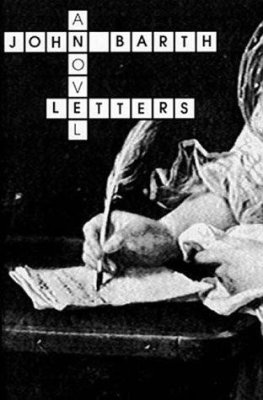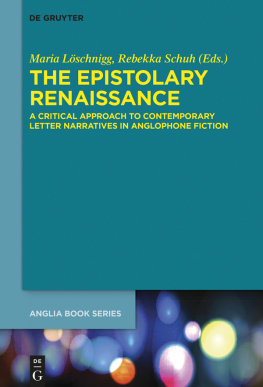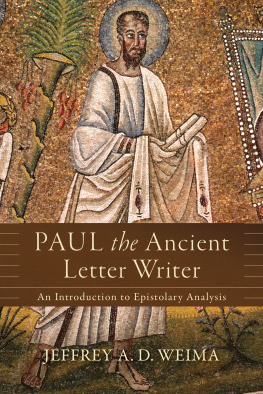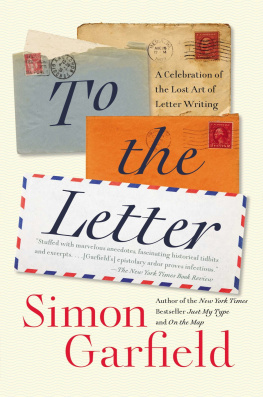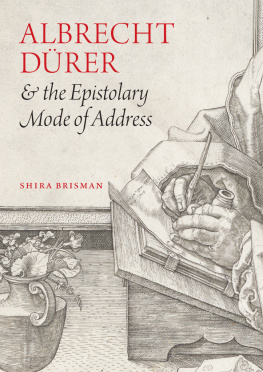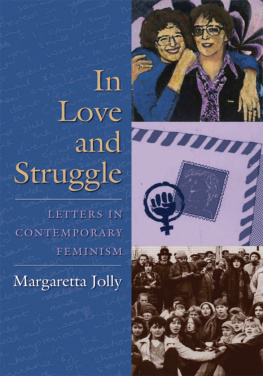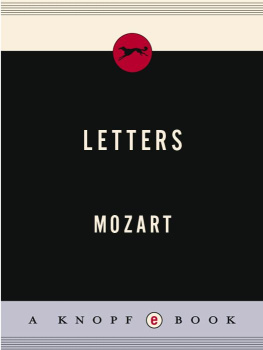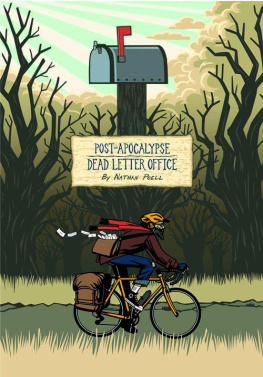EPISTOLARY SPACES
Epistolary Spaces
English Letter Writing from the Foundation of the Post Office to Richardson's Clarissa
James How
First published 2003 by Ashgate Publishing
Reissued 2018 by Routledge
2 Park Square, Milton Park, Abingdon, Oxon OX14 4RN
711 Third Avenue, New York, NY 10017, USA
Routledge is an imprint of the Taylor & Francis Group, an informa business
Copyright James How 2003
The Author has asserted his moral right to be identified as the author of this work in accordance with the Copyright, Designs and Patents Act, 1988.
All rights reserved. No part of this book may be reprinted or reproduced or utilised in any form or by any electronic, mechanical, or other means, now known or hereafter invented, including photocopying and recording, or in any information storage or retrieval system, without permission in writing from the publishers.
Notice:
Product or corporate names may be trademarks or registered trademarks, and are used only for identification and explanation without intent to infringe.
Publisher's Note
The publisher has gone to great lengths to ensure the quality of this reprint but points out that some imperfections in the original copies may be apparent.
Disclaimer
The publisher has made every effort to trace copyright holders and welcomes correspondence from those they have been unable to contact.
A Library of Congress record exists under LC control number: 2002032998
ISBN 13:978-1-138-71202-7 (hbk)
ISBN 13:978-1-315-19882-8 (ebk)
I first began to put together the initial ideas that led to the publication of this book with the help of two things.
First, an award from the Arts and Humanities Research Board (AHRB) allowed me to take a postgraduate course in English Literature at the University of Edinburgh. This award hung in the balance for a few days as a result either of a lost notification slip or of the failure of the Post Office to deliver the award letter to my mother's house. I've never quite worked out which, and guess it doesn't matter now. By the time I discovered the award letter had been sitting unread in my local post office for a couple of weeks the offer had expired. Peter Uglow managed to convince the AHRB that the case merited a little flexibility, so thanks to him. Did this incident affect any of the conclusions I draw about the Post Office in its early years in this book? Of course not ...
Second, was the course on letters run by Karina Williams that I took at Edinburgh. Karina went on to become the supervisor of my Ph.D. thesis, made possible by a second award from the AHRB. Thanks Karina for all your meticulous and considered readings not only of the chapters to be found here, but also of all the false starts and dead ends explored along the way.
Several other people provided valuable readings of these chapters over the course of the last seven years. Thanks to Bob Irvine, Penny Fielding, Susan Spencer, Colin Nicholson, Brean Hammond, Martin Willis, Erika Gaffney, Kristen Thorner and the two anonymous readers arranged by Ashgate. And thanks to Douglas Glickman, Christoph Lindner and Martin Willis for fun times in Edinburgh. You three will know that I do not use the word 'fun' lightly.
Finally, thanks to Lorna Uglow and to Katharina Strobel.
Lorna, my mother, helped me out on numerous occasions and in many different ways throughout my studies and during the writing of this book. This is probably the right place finally to admit that I didn't really think it was you who lost the AHRB notification slip by accidentally dropping it behind the fridge. I was only 'joking'.
Katharina and I met at Edinburgh in 1995. In 1996 I stayed in Edinburgh and she went to work in the east of Germany as a journalist. We wrote a whole lot of letters and emails in the intervals between visits and telephone calls. So I was thinking about correspondence not only in theory, but also in practice for much of the time 1 was writing this book. In fairness to the Post Office, not one letter got lost in all that time. (Although, come to think of it there was a parcel one Christmas that took about a month to deliver.) Katharina also provided some of the most incisive criticisms of later drafts of this book. Let's just say that anyone reading this book has a lot to thank her for in what got left out.
Studies in Early Modern English Literature
The series focuses on literary writing of the seventeenth and eighteenth centuries. Its objectives are to examine the individuals, trends, and channels of influence of the period between the Renaissance and the rise of Romanticism. During this period the English novel was invented, poetry began to tackle its unsteady relationship with non-literary discourse, and post-Shakespearean drama reinvented itself.
Alongside studies of established figures, the series will include books on important but lesser-known writers and those who are acknowledged as significant but given slight attention: typically, William Cartwright, James Shirley, John Denham, Edmund Waller, Isaac Watts, Matthew Prior, William D'Avenant, Mark Akenside and John Dyer. Also of particular interest are studies of the development of literary criticism in this period, monographs which deal with the conditions and practicalities of writing - including the practices of the publishing trade and financial and social circumstances of writing as a profession - and books which give special attention to the relationship between literature and other arts and discourses.
Monographs on a variety of writers and topics will be accepted; authors are invited to combine the best traditions of detailed research with astute critical analysis. The use of contemporary theoretical approaches will be acceptable, but every book will be founded upon historical, biographical and textual scholarship.
Professor Richard Bradford,
University of Ulster
A born letter-interceptor. You can see it in his eye.
Chuffie's description of the American millionaire J. Washburn Stoker, in P.G. Wodehouse's Thank You Jeeves (1977, 54)
This book examines the role of the British Post Office during its first hundred years in shaping letter-writing practice: spanning the last half of the seventeenth and the first half of the eighteenth centuries. It is about why people chose to use the newly available postal services and about how they experienced the reading and writing of the letters they received and sent. My argument is that the foundation of a Post Office available to the general public was an event which opened up new 'epistolary spaces', much as the setting up of the Internet in our own era opened up new and seemingly unlimited cyberspaces. Social spaces analogous to cyberspaces immediately began to be imagined by letter writers and readers. Within these spaces people of the period were ableat least for a part of the timeto live and to think, and hence to act. My concept of epistolary spaces can be applied to the study of all letters sent by postal services. The purpose of this book, however, is only to study how such spaces came into being in England and how they were experienced and used over the course of their first, and perhaps most dynamic, hundred years of existence. Epistolary spaces have not collapsed or disappeared today, even though personal letter writing has largely been effaced and cast into the shadows of history and quaintness by the popularity of emails. To the contrary, such spaces are still available to anyone who chooses to send letters by what computer users now refer to disparagingly as the 'snail mail'. The seductiveness and speed of cyberspaces have merely overtaken them. This book will then be of use to all of those hoping to find new ways of reading a wide variety of letters.


